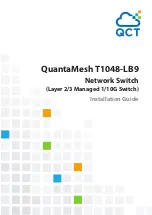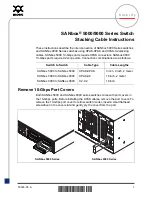
139
Figure 39
VLAN tag placement and format
A VLAN tag includes the following fields:
•
TPID
—16-bit tag protocol identifier that indicates whether a frame is VLAN-tagged. By default, the
TPID value is 0x8100, indicating that the frame is VLAN-tagged. However, device vendors can set
TPID to different values. For compatibility with neighbor devices, configure the TPID value on the
device to be the same as the neighbor device.
•
Priority
—3-bit long 802.1p priority of the frame. For more information, see
ACL and QoS
Configuration Guide
.
•
CFI
—1-bit long canonical format indicator that indicates whether the MAC addresses are
encapsulated in the standard format when packets are transmitted across different media. Value 0
(the default) indicates that the MAC addresses are encapsulated in the standard format. Value 1
indicates that MAC addresses are encapsulated in a non-standard format. The CFI is 0 in Ethernet.
•
VLAN ID
—12-bit long, identifies the VLAN that the frame belongs to. The VLAN ID range is 0 to
4095. VLAN IDs 0 and 4095 are reserved, and VLAN IDs 1 to 4094 are user configurable.
A network device handles an incoming frame depending on whether the frame is VLAN tagged and the
value of the VLAN tag. For more information, see "
Introduction to port-based VLAN
Ethernet supports encapsulation formats Ethernet II, 802.3/802.2 LLC, 802.3/802.2 SNAP, and 802.3
raw. The Ethernet II encapsulation format is used here. For how the VLAN tag fields are added to frames
encapsulated in the other formats for VLAN identification, see related protocols and standards.
For a frame with multiple VLAN tags, the device handles it according to its outer-most VLAN tag and
transmits its inner VLAN tags as payload.
Protocols and standards
IEEE 802.1Q,
IEEE Standard for Local and Metropolitan Area Networks: Virtual Bridged Local Area
Networks
Configuring basic VLAN settings
Step Command
Remarks
1.
Enter system view.
system-view
N/A
2.
(Optional.) Create a
VLAN and enter its view,
or create a list of VLANs.
vlan
{
vlan-id1
[
to
vlan-id2
]
|
all
}
By default, only the system default VLAN
(VLAN 1) exists.
3.
Enter VLAN view.
vlan
vlan-id
To configure a VLAN after you create a list
of VLANs, you must perform this step.
4.
Configure a name for
the VLAN.
name
text
By default, VLAN names are in the format
VLAN
vlan-id
. For example, the name of
VLAN 100 is
VLAN 0100
by default.
















































